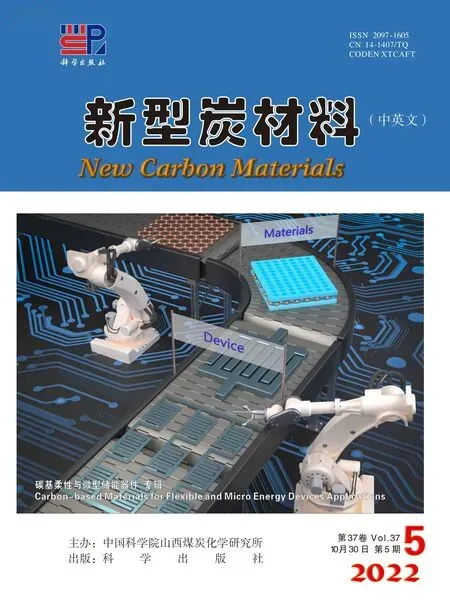Guide for Authors
2022-10-26
is a bimonthly journal published with the permission of the Ministry of Science and Technology and of the State News and Publication Agency. The journal is sponsored by the lnstitute of Coal Chemistry, Chinese Academy of Sciences, and is published by Science Press.
Aims and Scope
publishes research devoted to the physics, chemistry and technology of those organic substances that are precursors for producing aromatically or tetrahedrally bonded carbonaceous solids, and of the materials that may be produced from those organic precursors. These materials range from diamond and graphite through chars, semicokes, mesophase substances, carbons, carbon fiters, carbynes,fullerenes and carbon nanotubes, tec. Papers on the secondary production of new carbon and composites materials (for instance, carbon-carbon composites) from the above mentioned various carbons are also within the scope of the journal. Papers on organic substances will be considered if research has some relation to the resulting carbon materials.
Manuscript Requirements
1.accepts Research Paper, Short Communication and Review. The number of words in each Research Paper should be less than 8 000 words. Short Communication <4 500 words. There is no maxium of words for Review.
2. Manuscript including an abstract, graphical abstract, highlight, keywords, reference list, original figures and captions, tables. The figures can be edited by Origin. And the resolution of TEM, SEM, AFM, etc. images should be high.
3. Manuscript should be accompanied with key words placed after Abstract and a short resume of first author (name, academic degree, professional position) placed in the end of 1st page of text as foot-note. Corresponding author and his (her) E-mail address should also be mentioned.
4. All illustrations, photographs, figures and tables should be on separate sheets, figure captions should be typed separately, not included on the diagram.Authors are requested to submit original photographs,which should have good contrast and intensity.
5. References should be individually numbered in the order in which they are cited in the text, and listed in numerical sequence on separate sheets at the end of the paper,typed in double spacing. Remember that "unpublished works" are not references! In the reference list, periodicals [1], books [2], multi-author books with editors [3], proceedings [4], patents [5], and thesis [6] should be cited in accordance with the following examples:
[1] Kandalkar S G , Dhawale D S,Kim C K, et al. Chemical synthesis of cobalt oxide thin film electrode for supercapacitor application[J]. Synthetic Metals,2010,160(11): 1299-1302.
[2] lnagaki M, Kang F Y.Carbon Materials Science and Engineerng-From Fundamentals to Applications[M]. Beijing: Tsinghua University Press,2011: 3-6.
[3] Toropov V V, Jones R, Willment T, et al. Weight and manufacturability optimization of composite aircraft components based on a genetic algorithm[P]. 6th World Congresses of Structural and Multidisciplinary Optimization, Rio de Janeiro, Brazil, 2005, 30.
[4] Yang H. Deposit,doping and photocatalytic activity of fibrous TiO[D]. Dalian University of Technology, 2007.
[5] Hemmert D, Shiraki K, Yokoyama T, et al. Optical diagnostics of shock waves generated by a pulsed streamer discharge in water [C]. Pulsed Power Conference, 2003. Digest of Technical Papers. PPC-2003. 14th IEEE International. IEEE, 2003, 1: 232-235.Note: For the references with more than three authors, please give the first three and mark "et al".
6. Publication of papers in the journal is free of charge.
7. Manuscript Submission: https://www.sciencedirect.com/journal/new-carbon-materials/
杂志排行
新型炭材料的其它文章
- Preface
- 《新型炭材料》征稿简则
- 基于界面膜清洗的废旧锂离子电池石墨负极的再生修复
- A high-rate and ultrastable anode for lithium ion capacitors produced by modifying hard carbon with both surface oxidation and intercalation
- The interfacial embedding of halogen-terminated carbon dots produces highly efficient and stable flexible perovskite solar cells
- Controllable fabrication of superhierarchical carbon nanonetworks from 2D molecular brushes and their use in electrodes of flexible supercapacitors
